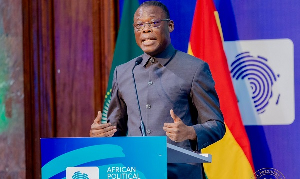The fallout between Mr. John Jinapor and Madam Ursula Owusu a few weeks ago may be considered a normal part of the ongoing political struggles between the two major political tents of NDC and NPP. But I would like to look at that incident from a different angle that may have escaped all of us for a while. The male dominance in the public sphere is crumbling not only because women have found their voice as a result of globalization or our democratization processes, but because society can do better with the presence of our female colleagues. To this end, I would like to argue here that Mr. Jinapor consciously or subconsciously was speaking for a large majority of men who subscribe to patriarchal principles and so find the presence of (independent) women especially in the public sphere as a threat to their long-held but fragile and unsustainable political, economic and socio-cultural dominance.
The apology expressed by Mr. Jinapor (whether he was coerced by his Boss or not) may be sincere, and the time it took for him to come forward with that apology is a demonstration of how the male in society is struggling to come up with better ways to respond to the social upheaval, a phenomenon called women’s empowerment or gender equality. The underlying reasons for the male struggles to deal with the participation and inclusion of women in the public discourse organization have nothing to do with the fact that the phenomenon is foreign to our socio-cultural underpinnings. Neither is it peculiar to the democratic processes in Ghana. It is important to stress also that there are as many John Jinapors in the NDC as there are in the NPP or any other political group. And that women who also happen to be public figures from either side of the political divide such as Amma Benyiwa Doe, Dr. Mary Grant, Nana Konadu Agyemang Rawlings, Christine Churcher, Grace Omaboe, Elizabeth Ohene, Samia Nkrumah, as well as those who may be less political like Dr. Esther Ocloo, Joyce Aryee, Gifty Affenyi-Dadzie and many others have equally been victims of outbursts from the likes of John Jinapor. It is true that change is difficult and takes time but we cannot continue to excuse or put up with the different John Jinapors in our society any longer. I do not think that all the women (and possibly some men) who threatened to go on demonstration to register their displeasure with Mr. Jinapor and his Boss belonged to a particular political party or ideology. And that will be the kinds of collective response that as a society we can marshal to minimize or cast out such behaviors.
As a society, I think we have come a long way but has achieved so little in respect of helping one important part of our development partners, women, to actively participate in the national development process. Thomas Humphrey Marshall, a British sociologist once argued that a citizen is only a full citizen if they possess the three kinds of rights namely civil, political and social rights. The relevance of Marshall’s argument to this article is found in the fact that the presence of vibrant women’s movements signifies the existence in society of some combination of the three rights which in turn has the potential to generate alternatives for social change that make societies more democratic, encourages participation and lead to a more just and freer public engagement. Thus instead of doing a John Jinapor to our mothers, sisters and wives, the Ghanaian society ought to find ways to celebrate the role that our empowered women are playing in the civil, political and social circles to ensure responsive governance and national development.
Meanwhile, it would not be out of place for our sister, mothers and wives to also seek ways to help their sons, brothers and husbands to acknowledge and be able to transition into the new age of civil society and public discourse organization where men and women are co-equal participants. After all, the women’s movement did not achieve any of their progress overnight, and that cooperation with the men is likely to engender greater results for their groups and also for society generally. It took years of collective action through the associational fabric and the promotion of values-based actions that act as alternatives to fierce individualism and entrenched patriarchy, very principles which according to Sonia Reverter-Banon, has propelled women as non-citizens to become organized into civil society organizations. These women’s movements have thus become a sine qua non to contemporary democratic development both in Western and developing democracies around the world.
Patrick Tandoh-Offin
Opinions of Thursday, 1 July 2010
Columnist: Tandoh-Offin, Patrick
John Jinapor and the perpetuation of a fading patriarchic dynasty
Entertainment













